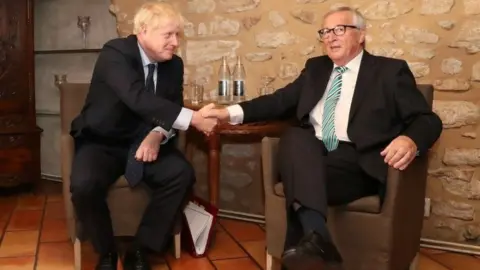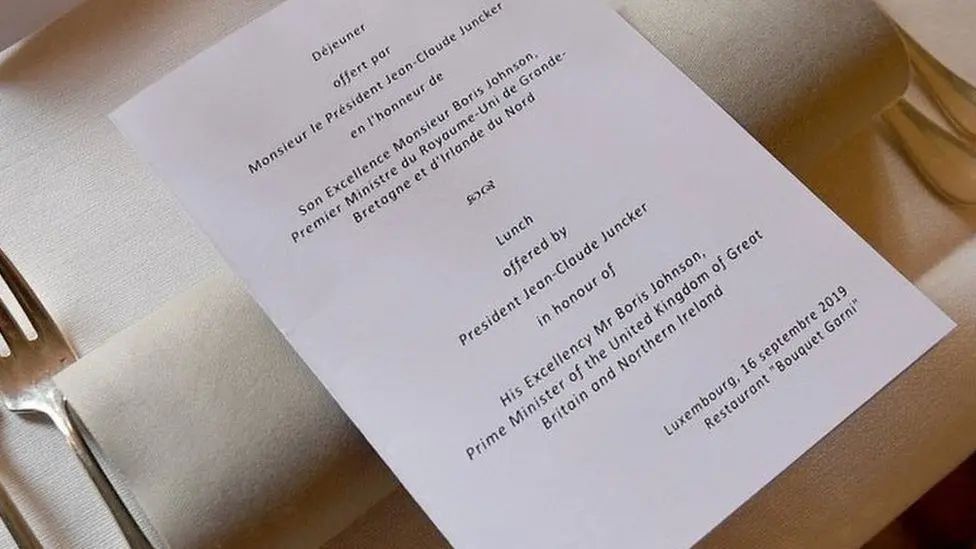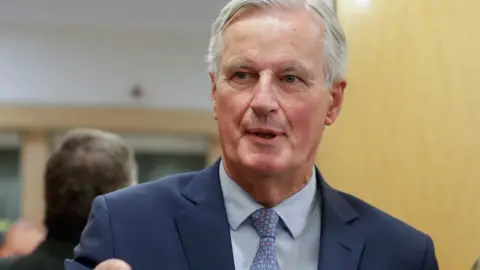Brexit is a 'nightmare', says Luxembourg prime minister
The Brexit process has turned into a "nightmare", the prime minister of Luxembourg has said after holding talks with UK PM Boris Johnson.
Xavier Bettel said Mr Johnson had failed to put forward any serious plans to allow a deal by 31 October.
But Mr Johnson, who cancelled his press conference because of the noise from protesters, said "there's been a lot of work" and "papers have been shared".
He urged the EU to make "movement" in its opposition to scrap the backstop.
Mr Johnson said his joint press conference was cancelled over fears the two leaders would have been "drowned out" by pro-EU protesters.
"I don't think it would have been fair to the prime minister of Luxembourg," he said.
"I think there was clearly going to be a lot of noise and I think our points might have been drowned out."
Political editor Laura Kuenssberg said that Number 10 had asked for the press conference to be held inside, according to sources.
Allow X content?
Mr Bettel, who conducted the planned press conference alone, said the "only solution" was the existing withdrawal agreement.
He said there were "no concrete proposals at the moment on the table" from the UK and said the EU "needs more than just words".
"We need written proposals and the time is ticking so stop speaking and act," he said.
"But we won't accept any agreement that goes against a single market, who will be against the Good Friday Agreement."
Away from the crowds, Mr Johnson said the EU must make "movement" in its opposition to scrap the Irish backstop, but insisted there was "just the right amount of time" to get a deal done.
When asked what concrete proposals he had made, Mr Johnson said "there's been a lot of work" and "papers have been shared".
"We've got to manage this carefully. Yes, we've got a good chance of a deal. Yes, I can see the shape of it. Everybody could see roughly what could be done," he said.
He reiterated that the UK will come out of the EU on 31 October "deal or no deal".


As soon as we arrived at the office of the prime minister of Luxembourg it became obvious a planned outdoor news conference could not go ahead.
The anti-Brexit protesters in the square numbered fewer than a hundred but their music and megaphones made it sound like a lot more and they occasionally used language you wouldn't want to hear on the news.
Behind the scenes the British and Luxembourgish delegations grappled with a diplomatic dilemma - move the event inside but exclude the majority of the journalists? Gamble that the demonstrators could pipe down for a bit? Silence the host to save the guest's blushes?
The end result saw Mr Johnson do a short interview at the ambassador's residence to be shared with everyone while Mr Bettel took to the stage next to an empty podium.
He used the moment in the spotlight to deliver an impassioned speech, made all the more dramatic by the fact he's famed as one of the EU's most smiley, mild-mannered leaders.

Earlier, both Mr Johnson and Mr Juncker - who met for the first time since the PM took office in July - agreed the discussions between the UK and EU "needed to intensify" and meetings "would soon take place on a daily basis".
But regardless of the outcome, No 10 said the PM would take the UK out of the EU on 31 October.
Downing Street also said Mr Johnson confirmed his commitment to the Good Friday Agreement - the peace deal brokered in Northern Ireland - and still had a "determination to reach a deal with the backstop removed, that UK parliamentarians could support".
 Reuters
ReutersMr Johnson has called the Irish backstop "undemocratic" and said it needed to be removed from any deal with the EU.
A Downing Street spokesperson said Mr Johnson also reiterated he would not request an extension and would take the UK out of the EU on 31 October.
The EU has said it is willing to look at alternatives, but that an insurance policy like the backstop must be in place.
The backstop is the controversial policy in the existing withdrawal agreement, rejected three times by MPs, which would require the UK to follow the EU's customs rules to ensure there are no physical checks on the border between Northern Ireland and the Republic.
Last week MPs passed a law that would force the prime minister to ask the EU for an extension to the 31 October deadline if a deal was not agreed by 19 October.
But the prime minister's official spokesman said: "The position of the PM is that we comply with the law, but that we are leaving on 31 October whatever the outcome."
They also confirmed that the current date set for a transition period - the time for the UK and EU to negotiate their future relationship after officially leaving - of December 2020 would not be extended.
 PA Media
PA MediaOver the weekend Mr Johnson told a newspaper that the UK would break out of its "manacles" like cartoon character The Incredible Hulk - with or without a deal.
The BBC's political editor Laura Kuenssberg said the issue of whether the UK had the legal right to leave on 31 October - come what may - could end up in court.
'Posturing'
Reports have suggested Mr Johnson is considering a plan to keep Northern Ireland more closely aligned to the EU after Brexit, as an alternative to the current Irish backstop.
The Democratic Unionist Party - which supports the Conservatives in Parliament - has rejected any plan that would see Northern Ireland treated differently to the rest of the UK.
The PM's spokesman would not give details, but said the government had "put forward workable solutions in a number of areas".
 EPA
EPAWriting in Monday's Daily Telegraph, Mr Johnson said he believed he could strike a deal with the EU within weeks and was working "flat out to achieve one".
"If we can make enough progress in the next few days, I intend to go to that crucial summit... and finalise an agreement that will protect the interests of business and citizens on both sides of the channel, and on both sides of the border in Ireland," he wrote.
Many MPs have also questioned how serious the government is about getting a deal, such as former justice secretary David Gauke who said "detailed proposals" had yet to be put forward.
"It still remains the case the UK government has not produced detailed proposals as to how it wants to replace the Irish backstop," he told Radio 4's Today.
Foreign Secretary Dominic Raab said the PM would stress he wanted a deal, but there had to be "some finality" to it.
He said claims from the EU side that the UK was dragging its feet were part of the "tactical posturing that goes on in any negotiation".
He told Today the UK had been clear the "anti-democratic backstop" had to be removed from the current withdrawal agreement, and the outline of future trading relationship set out in the political declaration had to be much more ambitious.
"The EU knows our position. Lots of the detail has been talked through at technical and political level," he said. "The framework is very clear.
"But of course the nature of these negotiations is that there will be a tendency to rubbish things we put forward in order to exact further demands. We are not going to get involved in that."

The week ahead
Monday: Boris Johnson meets European Commission President Jean-Claude Juncker for Brexit talks in Luxembourg
Tuesday: The Supreme Court begins to consider the legality of Mr Johnson's decision to suspend parliament until 14 October
Wednesday: The European Parliament to debate Brexit
